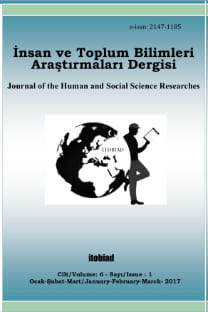Kurumsal Yapı Göstergeleri, İhracat ve Doğrudan Yabancı Sermaye Yatırımları Arasındaki Nedensellik İlişkisi: Bağımsız Devletler Topluluğu Örneği
Kurumsal Yapı Göstergeleri, İhracat, Doğrudan Yabancı Sermaye Yatırımları, Ekonometri, Bağımsız Devletler Topluluğu
Causality Relationship between Institutional Structure Indicators, Export and Foreign Direct Investments: the Case of Commonwealth of Independent States
Institutional Structure Indicators, Export, Foreign Direct Investments, Econometrics, Commonwealth of Independent States,
___
- Abdella, A. B., Naghavi, N. ve Yin Fah, B. C. (2018) The effects of corruption, trade openness and political stability on foreign direct investment: empirical evidence from BRIC countries. International Journal of Advanced and Applied Sciences, 5 (3), 32-38.
- Akkuş, Ö., (2017). Ekonomik politika belirsizliği ve politik istikrarsızlığın büyüme üzerindeki etkisi. Anadolu Üniversitesi Sosyal Bilimler Dergisi, 17 (3), 27-42.
- Akpan, U. F. ve Atan, J. A., (2016). Relationship between trade openness, institutions and economic growth in Sub-Saharan Africa: a further look at the evidence. British Journal of Economics, Management & Trade, 15 (1), 1-20.
- Artan, S. ve Hayaloğlu, P., (2015). Doğrudan yabancı sermaye yatırımlarının kurumsal belirleyicileri: OECD ülkeleri örneği. Ege Akademik Bakış, 15 (4), 551-564.
- Aysan, A. F. ve Veganzones Varoudakis, M.A. (2007). How do political and governance institutions affect private investment decisions? an application to the Middle East and North Africa?. Boğaziçi Üniversitesi Araştırma Raporu, ISS/EC-2007-05.
- Bayat, T., Kişman, Z. A. ve Taşar, İ., (2018). The macroeconomic determinants of political stability in transition economies after collapse of Soviet Union. Cumhuriyet Üniversitesi İktisadi ve İdari Bilimler Dergisi, 19 (1), 163-175.
- Bussmann, M., Scheuthle, H. ve Schneider, G. (2006). Trade liberalization and political instability in developing countries. Trappl, R., (edt.), Programming for peace: computer-aided methods for international conflict resolution and prevention, (49-70), Dordrecht: Springer.
- Dehshiri, H. M., Sameti, M. Ve Sameti, M.. (2012). Impact of human development index and rule of law to attract foreign direct investment in selected developing countries, MPRA. No.81479.
- Eren, K., (2012). Bağımsız Devletler Topluluğu içinde Türk Cumhuriyetleri. Ekonomi ve Yönetim Araştırmaları Dergisi, 1 (1), 43-73.
- Gür, T. H. ve Akbulut, H. (2012). Gelişmekte olan ülkelerde politik istikrarın ekonomik büyüme üzerine etkisi. Sosyo Ekonomi, 120113, 281-299.
- Hurlin, C. ve Dumitrescu, E. I. (2012). Testing for Granger non-causality in heterogeneous panels, HAL Archives, No: Halshs-00224434.
- Kurul, Z. ve Yalta, Y. (2017). Relationship between institutional factors and FDI flows in developing countries: new evidence from dynamic panel estimation, Economies, 5 (17), 1-10.
- Mengistu Alemu, A. (2014). Quality of institutions and FDI inflow: evidence from Asian economies, Korea Review of International Studies, 16 (1), 35-47.
- Nazeer, A.M. ve Masih, M. (2017). Impact of political instability on foreign direct investment and economic growth: evidence from Malaysia, MPRA. No.79418.
- Pan, C., Chang, T. ve.Wolde-Rufael, Y. (2015). Military spending and economic growth in the Middle East countries: bootstrap panel causality test, Defence and Peace Economics, 26 (24), 443-456.
- Pesaran, M. H. (2004). General diagnostic tests for cross section dependence in panels, CWPE, 0435.
- Pesaran, M. H. (2007). A simple panel unit root test in the presence of cross-section dependence, Journal of Applied Econometrics, 22, 265-312.
- Saidi, Y., Ochi, A. ve Ghadri, H. (2013). Governance and FDI attractiveness: some evidence from developing and developed countries, Global Journal of Management and Business Research Finance, 13 (6), 15-24.
- United Nations, Erişim tarihi:https://www.un.org/en/development/desa/policy/wesp/wesp_current/2014wesp_country_classification.pdf
- World Bank, (2019a), Erişim tarihi: https://data.worldbank.org/indicator/NY.GDP.MKTP.PP.KD
- World Bank, (2019b), Erişim tarihi: https://data.worldbank.org/indicator/NE.EXP.GNFS.ZS
- World Bank, (2019c), Erişim tarihi: https://info.worldbank.org/governance/wgi/#doc
- WTO. (2004). Governance and institutions, in World Trade Report 2004, Erişim adresi: https://www.wto.org/english/res_e/booksp_e/anrep_e/wtr04_2d_e.pdf.
- Yerdelen Tatoğlu, F., (2013). İleri panel veri analizi Stata uygulamalı, 2.bs. İstanbul: Beta.
- Zeren, F. ve Arı, A. (2013). Trade openness and economic growth, International Journal of Business and Social Sciences, 4 (9), 317-324.
- ISSN: 2147-1185
- Yayın Aralığı: 4
- Başlangıç: 2012
- Yayıncı: Mustafa SÜLEYMAN ÖZCAN
İDRİS ÇAKIROĞLU, N. Oya LEVENDOĞLU
Çin’de Sosyal Devlet Sorunsalı: Hukou Problemi
Üniversite Öğrencilerinde Akıllı Telefon Bağımlılığı
HATİCE KUMCAĞIZ, Özlem TERZİ, Bozkurt KOÇ, Murat TERZİ
Fred McGraw Donner’in İslâm Tarihçiliği ve İnananlar Hareketi Tezi Üzerine
CAMELS Değerlendirme Sistemiyle Bankaların Finansal Performanslarının TOPSİS Yöntemiyle Analizi
Mehmet KAYGUSUZ, Behlül ERSOY, TUNGA BOZDOĞAN
Finansal Halkla İlişkiler Bağlamında Kuzey Kıbrıs’ta Yürütülen Halkla İlişkiler Faaliyetleri
Türkiye’de Enflasyon Faiz İlişkisi: Nedensellik Analizi
Batken’de (Kırgızistan) ve Batman’da (Türkiye) Ters Lale Efsaneleri
